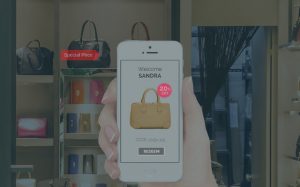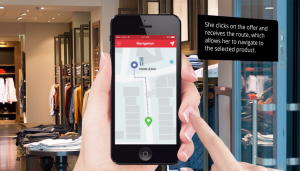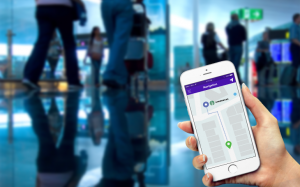It seems like no matter where I go, the word “innovative” is inescapable. Company websites, commercials, descriptions of products – innovation has become a marketing mantra. However, despite all the hype surrounding innovation, there are so few things truly innovative in today’s society that when something really progressive comes along, it should be recognized.
That being said, iBeacons are, unmistakably, the next innovative technology. As Marketing Communications Executive for Softweb Solutions, a software and mobile application development company, I am doubly excited about the potential of these new devices. iBeacons were developed by Apple and are small, affordable, low-energy Bluetooth emitters that respond and communicate with an app on your smartphone or tablet. In addition to this, beacons can track where a visitor goes and send them a message dependent upon how long they stay in that area. Using this indoor location mapping service, owners get real-time analytics which help them track in-store footfall and hotspots as well as creating more sales opportunities through smart marketing. Most iBeacons are completely waterproof (though keep in mind that Bluetooth signals are efficiently absorbed and blocked by water), have a battery life of around two years, and a range of up to 150 feet. It is already being touted (by Apple and third-parties alike) as the next step in the evolution of increasing ROI. Not to mention, a number of retailers are already using them in their stores to increase sales.
We’ve all been there – you see something you want in the store, spend a bit of time weighing the pros and cons of buying it, and then telling yourself you can get it cheaper online. For example, I was just in a store this past weekend deciding whether or not to purchase a Blu-ray player, but walked out after checking prices on Amazon with my smartphone. And this is not an atypical experience; I often speak with customers and store owners who notice this happening. Increasingly, buyers (especially younger buyers and millennials) are embracing eCommerce as their preferred method of choice when it comes to shopping, and the days of clipping coupons are gone. I may have walked out of that store without a Blu-ray player, but what if my phoned had chimed to let me know that there was a 15% off coupon I could use?
Although the retail uses alone could reinvent the way we consider marketing to our customers, there are a myriad of potential uses for iBeacons. As I mentioned before, iBeacons have an indoor location mapping service – sort of an indoor GPS – which can be used in nearly limitless ways. Lollapalooza comes to mind, having just come and gone. A large outdoor venue with many main stages, substages, concession stands, water fountains and restrooms is an easy place to get lost. By placing iBeacons around the venue, attendees could receive reminders, directions and updated schedules to make sure they get to their favorite artist on time. Another similar use-case: I attended this year’s Techweek Chicago, was unfamiliar with the layout of the venue, and ended up arriving late or completely missing a number of talks I had wanted to see. I had even downloaded the Techweek app to plan out my days, but without a floor plan or easy directions, I ended up lost on the first day.
One of the nicer things about iBeacons from a usability standpoint is that they don’t require help from IT to use after they’ve been integrated into your mobile app’s backend. You just purchase the iBeacons, integrate them into an application, and use a backend platform to easily control the distance at which a customer receives a message, when and how often they receive a message, and what the message is. For example, Softweb Solutions provides a backend that has an easy-to-use interface, footfall and hotspot tracking, and the option to upload a floor plan of your store so you can test different layouts and beacon positions to maximize the benefits they provide.
Now, when it comes to claims of a new technology being called innovative, I’ll be the first to tell you: I’m a skeptic. Near Field Communication’s (NFC) failure to deliver left a bad taste in buyer’s mouths, especially since certain phone manufacturers (not to point any fingers) marketed it so heavily as an “innovative” perk of their smartphone. This is not the case with iBeacons using a smart, all-in-one management platform like iConnect, as many businesses have already integrated beacon technology into their business model with incredible success.
In short, iBeacons will be the future of interactive, smart marketing, and we should all start to expect a few more notifications popping up on our phones when we enter our favorite shops.
Softweb Solutions
866-345-7638
info@softwebsolutions.com
Everything You Wanted to Know About iBeacons (But Were Afraid to Ask)
Need Help?
We are here for you
Step into a new land of opportunities and unearth the benefits of digital transformation.






